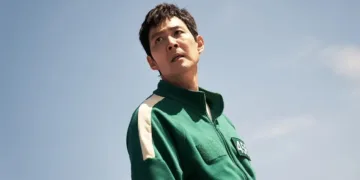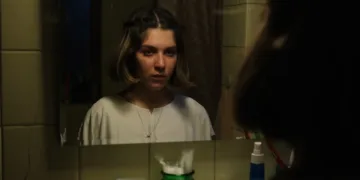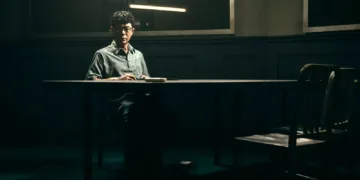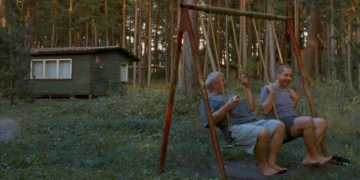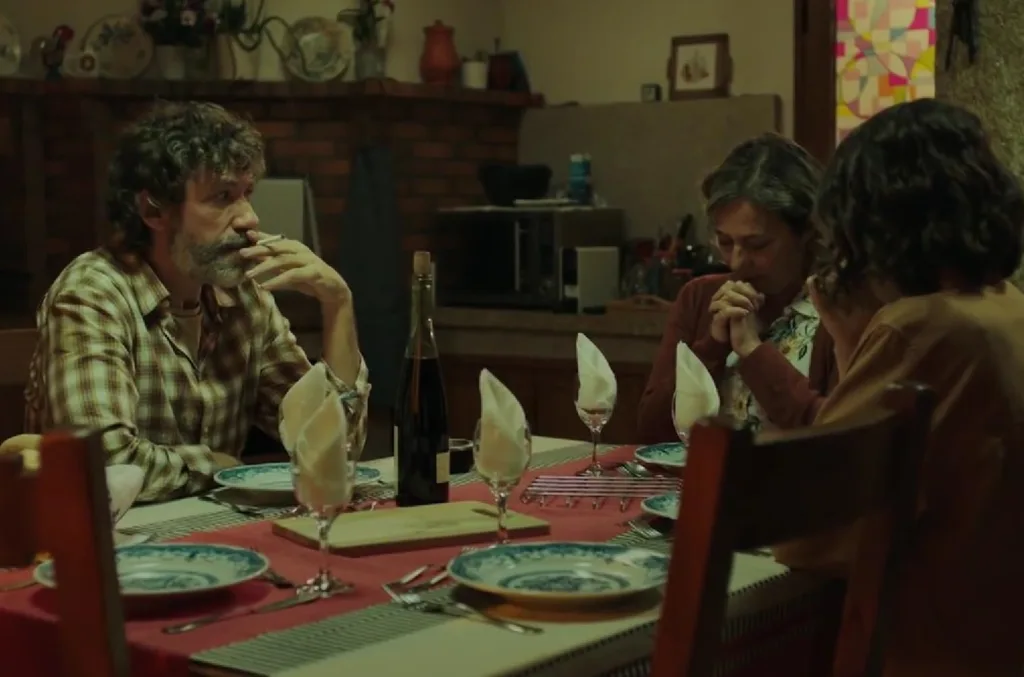Antonio Sequeira’s “Autumn” offers a window into Portuguese life, focusing on a family unit whose familiar contours are subtly reshaped by departure and the passage of time. The film follows this rural household through the cycle of a year, delineated by the four seasons, a period made significant by the eldest son, Tomás, leaving for university studies in London.
This journey sets up an immediate dialogue between the sun-drenched, tradition-steeped Portuguese countryside, particularly the family’s vineyard which grounds them in the soil, and the sprawling, anonymous urbanity of London that begins to claim Tomás.
“Autumn” thereby positions itself to explore not just the intimate shifts within a family, but also the broader tremors of change as local lifeways intersect with global currents, all rendered with a gentle, observant eye.
Portrait of a Household Before the Shift
At the heart of “Autumn” is a family whose initial dynamics are deeply rooted in their rural Portuguese setting. Otávio, the father and vintner, embodies a connection to the land that is almost elemental; his methods are old-school, his humor often veers into the politically incorrect, a trait that speaks to a certain generational or regional character, and his emotions are frequently kept beneath a stoic surface.
Susana, his wife and a nurse, presents a more openly sentimental counterpoint, her anxieties about Tomás’s leaving and the impending emptiness of the nest palpable from the outset. Tomás himself is a figure of youthful energy, his departure for London the narrative’s initiating force, promising new experiences that will inevitably feedback into the family system.
His younger sister, Belinha, is an observant presence, acutely feeling her brother’s absence while her own aspirations begin to stir. Their collective life, marked by routines like working the vineyard or shared meals, paints a picture of established bonds, soon to be tested by distance and Tomás’s first steps into a wider world.
Currents of Change in a Generational Drama
Tomás’s seasonal returns from London serve as narrative checkpoints, revealing the subtle and significant ways he is being remolded by life abroad – new ideas take root, his appearance might subtly alter with a small tattoo, and a sense of detachment from his origins begins to surface. This personal evolution inevitably creates friction when measured against the steadfast traditions of his home, particularly embodied by Otávio.
The father’s resistance to new ways, his sometimes jarringly out-of-step pronouncements on social matters, become a focal point for the tension between ingrained local values and the cosmopolitan perspectives Tomás introduces. Such moments, like his awkward interactions around Tomás’s London-bred girlfriend, Gaya, whose very presence (and dietary needs) can seem to challenge the household’s norms, highlight how deeply cultural insularity can be unsettled by external influence.
This dynamic forces a re-evaluation of what is considered “normal” or acceptable, a question that resonates differently depending on one’s cultural standpoint. Belinha’s own desire to study abroad further underscores this theme, representing a younger generation’s ambition pressing against the perceived limits of tradition or economic pragmatism within their Portuguese context.
Susana, meanwhile, navigates her own transitions: the void left by her children, potential dissatisfaction in her nursing career as technology alters her connection with patients, and a quiet yearning for a life beyond her maternal role, sometimes tinged with nostalgia for her own youth.
The Visual Terroir and Seasonal Cadence of “Autumn”
Sequeira’s film leans into its Portuguese setting not merely as a backdrop but as an active participant in its storytelling, with the landscape of the Douro hills and the family vineyard conveying a distinct “terroir.” The visual palette often seems to favor the warm, earthy hues of rural Portugal, a choice that anchors the narrative in a strong sense of place.
This is contrasted implicitly, and sometimes explicitly through elements like Gaya’s brighter, perhaps more urban, attire, with the idea of London. The film’s structure, moving through autumn, winter, spring, and summer, is a familiar device, yet here it resonates with the agricultural rhythms of the vineyard and the cyclical nature of “saudade” – that uniquely Portuguese blend of longing and nostalgia – as departures lead to anticipated returns.
Symbolic objects and sequences deepen this connection: Tomás’s initial attachment to his bongos, later discarded, speaks to youthful identities shed; the communal, almost ritualistic, grape stomping signifies enduring tradition; a striking flashback where Susana carries a progressively older Tomás visually articulates the enduring, and perhaps burdensome, nature of maternal sacrifice.
Even the film’s title, “Autumn,” evokes the season of harvest and letting go. The reported use of MARO’s song “Saudade Saudade” in the soundtrack further cements this cultural specificity, weaving a layer of distinctly Portuguese melancholy and affection into the film’s naturalistic, observational style.
Imperfect Humanity and the Echoes of Connection
“Autumn” populates its world with characters marked by their imperfections, a quality that lends them a recognizable humanity. Otávio’s insensitivity, Susana’s sometimes overwhelming anxieties, Tomás’s fumbling steps toward maturity, and Belinha’s youthful insecurities are presented without overt judgment.
The film seems to invite a measure of understanding for their foibles, even if some behaviors, particularly Otávio’s, might provoke discomfort or criticism depending on the viewer’s own cultural lens. At its core, the film charts an emotional landscape defined by what often remains unsaid, the subtle miscommunications that create distance, and the profound loneliness that can exist even within tight family units.
It explores the pain of growth and the bittersweet ache of watching children forge their own paths. Yet, amidst these struggles, there are glimmers of adaptation and reconnection—perhaps a shared dance between Otávio and Susana, or a quiet acceptance of new realities—suggesting a resilient quality to their bonds, a capacity to endure the changing seasons of life.
Full Credits
Director: António Sequeira
Writer: António Sequeira
Producers: Joana Domingues, António Sequeira, Anastasiia Vorotniuk
Cast: Beatriz Frazão, Elsa Valentim, Miguel Frazão, Salvador Gil, Sara Barradas, Ricardo de Sá, Krupa Narci Givane
Director of Photography (Cinematographer): Anastasiia Vorotniuk
Editor: António Sequeira
Composer: Filipe Caetano
The Review
Autumn
"Autumn" offers a deeply felt, culturally specific meditation on family, transition, and the subtle shifts that redefine relationships. While its observational pace and portrayal of challenging traditional attitudes may not engage all viewers equally, its visual sensitivity and earnest depiction of imperfect lives finding their way through change make it a noteworthy piece of Portuguese cinema. It captures the universal ache of growth with an authentic Iberian voice.
PROS
- Authentic portrayal of Portuguese family life and its cultural nuances.
- Thoughtful exploration of universal themes like change, tradition, and generational shifts.
- Strong visual storytelling, making excellent use of its rural setting and seasonal structure.
- Nuanced characterizations that embrace human imperfections.
CONS
- The observational, slice-of-life pace may feel slow to some.
- Certain character behaviors, particularly the father's traditionalism, might be difficult for some viewers.
- Some thematic elements tread familiar ground in family dramas.














